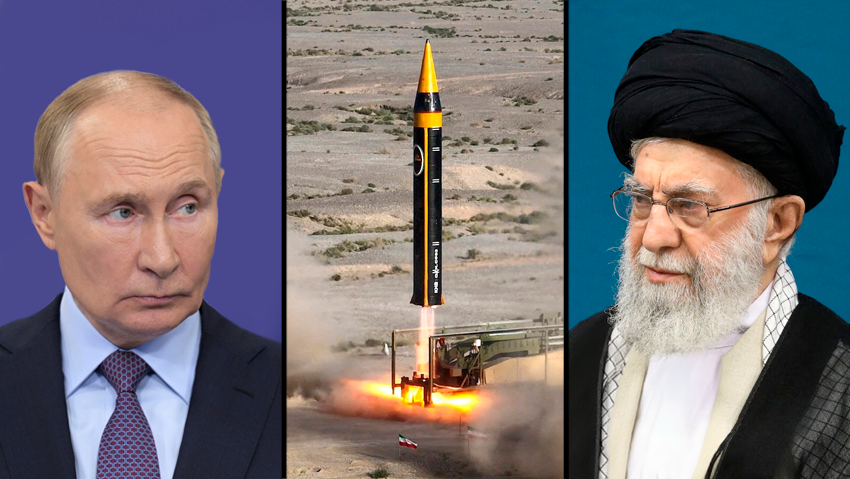Getting your Trinity Audio player ready...
For many years, Russia has striven to keep its distance from events in the Middle East. But the new post-October 7 reality has made this even more difficult than ever to achieve.
Indeed, since 2022, Russia’s defense relationship with Iran had already taken a big leap forward. Russia’s full-scale invasion of Ukraine led Moscow to seek warmer relations with Iran, especially in military partnerships, which has caused serious concern in the United States and Israel.
2 View gallery


Russian President Vladimir Putin and Iranian Supreme Leader Ayatollah Ali Khamenei
(Photo: Reuters, Alexei Nikolsky, Sputnik, Kremlin Pool Photo via AP, AFP PHOTO / HO / KHAMENEI.IR)
Russia is not only actively assisting Iran in hardening its defenses against future strikes, it is also providing Tehran with advanced military technologies and cash from arms sales, further enabling the mullahs to sow discord and violence across the region and beyond.
Cooperation has now moved past the previous patron-client dynamic, with Iran emerging as a key enabler of Russia’s air and ground campaign in Ukraine. Recent leaks confirm that the Kremlin is now seriously considering supplying weapons not only to Iran, but also to pro-Iran proxy groups that would likely use them to target Israeli forces.
U.S. Secretary of State Antony Blinken said on September 10 that Iran had now delivered Fath-360s missiles to Russia and would “likely use them in Europe within weeks in Ukraine.” Blinken emphasized that these missiles threatened European security and would likely be fired against short-range targets.
For the moment, the size of these weapon deliveries is limited by the situation in Ukraine. But if the intensity of the fighting in Ukraine wanes, Moscow will be free to export even more aircraft and missiles to Tehran—a scenario that is at the very least possible—and one that the U.S. and Israel should prepare for.
Britain, France and Germany have collectively warned that Iran’s stockpile of highly enriched uranium had “continued to grow significantly, without any credible civilian justification” and that it had accumulated four “significant quantities” that each could be used to make a nuclear bomb.
To that end, the United States, Germany, Britain and France have all imposed new sanctions on Iran, and the EU said the bloc was considering fresh measures targeting Iran's aviation sector. Russia and Iran collaborating closely together are therefore important considerations for the security of the West.
Western capitals should ultimately accept an uncomfortable new reality: that even if Russia’s war against Ukraine were to end, there is little hope that this Iran-Russia defense relationship will revert to its pre-2022 status quo. Both countries have identified needs for future military contingencies that they can help each other meet. Growing collaboration between Iran and Russia may also provide a “plank” to spur further military-technical cooperation between China, Russia, Iran and North Korea.
 Jennifer Teale
Jennifer TealeAs a result, the best the West can do is to disrupt this cooperation between Iran and Russia on the margins and focus on undermining it in sensitive areas, alongside sanctioning. Specifically, focusing can be directed toward complicating Iran and Russia’s procurement of electronics for high-end defense goods and seeking to derail impending deals through strategic diplomatic disclosures.
Potential obstacles to cooperation will also continue going forward such as both countries’ supply chain vulnerabilities, Russia’s desire not to antagonize its Gulf Arab partners and Russia’s enduring technological superiority vis-a-vis Iran in key areas. All these preclude the formation of a full-fledged and equal military-strategic partnership. And yet, the defense relationship between Iran and Russia is on a clear upward trajectory which the West should be mindful of.
Get the Ynetnews app on your smartphone:


